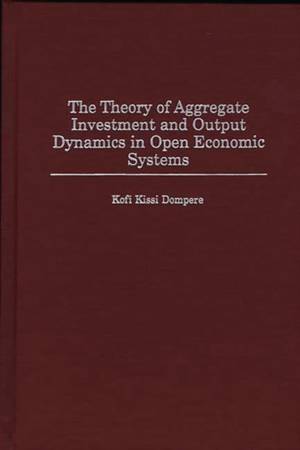
- Retrait gratuit dans votre magasin Club
- 7.000.000 titres dans notre catalogue
- Payer en toute sécurité
- Toujours un magasin près de chez vous
- Retrait gratuit dans votre magasin Club
- 7.000.0000 titres dans notre catalogue
- Payer en toute sécurité
- Toujours un magasin près de chez vous
The Theory of Aggregate Investment and Output Dynamics in Open Economic Systems
K K Dompere, Kofi K DompereDescription
Building on his companion volume on closed economic systems, Dompere develops a theory of aggregate investment, optimal capital, and output dynamics for open economic systems under neo-Keynesian conditions with special reference to growth policy. By constructing and tracing the path of equilibrium aggregate investment, the study isolates and analyzes the internal and external factors that influence the adjusting of investment to aggregate finance and profit. It examines the role international trade and finance play in alleviating domestic technological and savings constraints on capital creation and growth. The theory's conclusions are used to analyze the rate of accumulation and finance needed to support a rate of output growth selected as part of an internal aggregate decision process. The analysis is extended to aggregrate development capital-output planning.
The study goes on to discuss conceptual and aggregational problems of measures of economic openness implied in the data requirements across national economies. Here a unique set of theoretical measures of economic openness, different from the traditional, is developed. The book, further, presents a critique and appraisal of the essential capital elements implied by endogenous growth theory.Spécifications
Parties prenantes
- Auteur(s) :
- Editeur:
Contenu
- Nombre de pages :
- 208
- Langue:
- Anglais
- Collection :
Caractéristiques
- EAN:
- 9780313307942
- Date de parution :
- 30-11-99
- Format:
- Livre relié
- Format numérique:
- Genaaid
- Dimensions :
- 162 mm x 243 mm
- Poids :
- 489 g

Les avis
Nous publions uniquement les avis qui respectent les conditions requises. Consultez nos conditions pour les avis.






